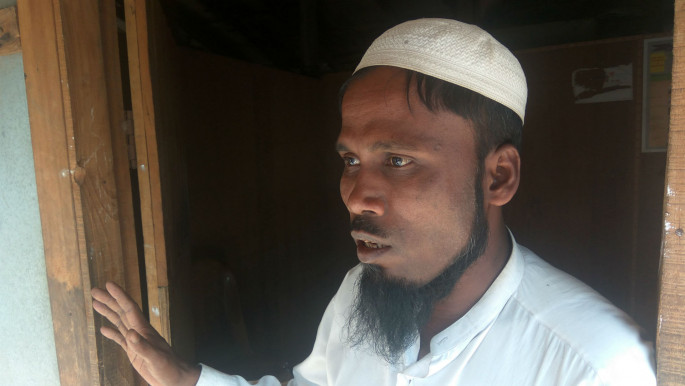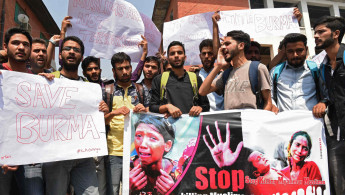'You'd better kill us first' - Rohingya refugees in Kashmir fear deportation to Myanmar
According to the UN's refugee agency (UNHCR), more than half a million people have fled the violence and more than 1000 may have been killed. Satellite data accessed by a rights body indicated widespread burning in at least 10 areas of Rakhine state. During recent crackdowns, refugees have reported sexual violence, torture, arson, arbitrary detention and premeditated mass killing by Myanmar security forces.
A large number of these refugees fled to India. An estimated 40,000 Rohingya Muslims are estimated to live in the Indian states of Telangana, Haryana, Uttar Pradesh, Delhi, Rajasthan, and Indian administrated Jammu and Kashmir (IAJK).
About 16,500 Rohingya in India have been provided with Identity cards by the United Nations high commissioner for refugees, but the Minister of State for Home Affairs, Karen Rijiju, has ruled this registration to be irrelevant.
Despite extensive condemnations made by Human Rights Watch against the government's decision, Rijiju famously described Rohingya refugees as "illegal immigrants" with no basis to live in India.
Read more: India's Rohingya refugees living in fear and squalor
As a result, the government said it intends to deport Rohingya refugees back to the country they fled from persecution in the first place, citing "security threats" over potential terrorism. In August, Rijiu directed state authorities to identify and deport "illegal immigrants", including Rohingya.
A plea against the government decision, made by Rohingya asylum seekers in New Delhi, is being reviewed by the Supreme Court. In its latest hearing, the Court called the Rohingya refugee problem an issue of a larger scale.
The bench, headed by Chief Justice Dipak Misra, said there is no doubt that a humanitarian issue is involved in Rohingya refugee problem, but national security is an important factor that must be kept in mind.
The bench has fixed November 21 to give detailed hearing on the petition filed against the government's' decision to deport Rohingya Muslims to Myanmar. However, on request of senior counsels like social activists and NGOs, the bench told them to approach in case any emergency arose during the intervening period.
Many Rohingya refugees of Jammu have said it is better to kill them than to deport them to Myanmar. They said the Supreme Court is aware of the problems they face in Myanmar and have hope the Supreme Court will overturn the decision made by the government.
These Rohingya refugees, often described as "the world's most persecuted minority", have been denied citizenship in Myanmar since 1982, which has effectively rendered them stateless.
The Rohingya, an ethnic population of over one million Muslims living in Myanmar's northern Rakhine state, were termed as the world's most persecuted community by the United Nations in 2013.
Kashmir
In Indian-controlled Jammu and Kashmir, there are around 1,600 families of Rohingya refugees living on the outskirts of Jammu city. In the last decade, scores of Rohingya families have fled from violence and persecution at the hands of the Myanmar government which denied them citizen under the 1982 Burmese citizenship law and took shelter in Jammu.
Most were forced to flee state violence in Myanmar in 2012. These disenfranchised Rohingya refugees are facing tremendous hardships. Most of them are laborers in profession and some have started small business around Jammu city. Every one of these refugees has his or her story to tell about the horror of life back home. All of these refugees have made a dramatic escape from Myanmar.
Recently, barriers were installed in and around Jammu city, with posters demanding Rohingya Muslims leave the area.
Alongside photographs of local political leaders from the Jammu and Kashmir National Panthers Party, including chairman Harsh Dev Singh and State Vice President Balwant Singh Mankotia, these hoardings warned Rohingya to immediately leave the state or "be thrown out".
![Mohammad Rafiq, 48, a Rohingya grocery shop owner in Jammu [TNA]](https://www.newarab.com/sites/default/files/styles/medium_16_9/public/media/images/C6A04809-0B2C-48AC-9FFE-530A10DA647C.jpg?h=d1cb525d&itok=-a21evk5) |
|
| Mohammad Rafiq, 48, a Rohingya grocery shop owner in Jammu [Aamir Ali Bhat / TNA] |
"We will return to our country once the situation becomes favorable," a 48-year-old Rohingya refugee, Mohammad Rafiq, lives in Jammu told The New Arab.
Read more: Rohingya refugees in India fear 'illegal' deportation to Myanmar
"We are absolutely terrified with the Indian government's decision," said Rafiq.
 |
How can be a little one year old kid be a terrorist? |  |
"The know there is a risk of torture or serious violations if we return, but the government still wants to deport us".
Another Rohingya refugee, Jalal Ahmad, lives in a makeshift shelter in the Bathindi area of Jammu. He alleged that his father and brother were burnt to death by the Myanmar security forces in 2012, causing him to leave the country and take shelter in Jammu.
Ahmad's attempt to live a peaceful life may not be possible due to the government's decision to expel the Rohingya.
"Is there not any place for us in this world, where we can live peacefully?" Ahmad, 40, asked.
"Myanmar security forces are killing us as if we are not human beings. They have burnt our property, killed our dear ones and raped women in front us."
Since 2016, Rohingya refugees in Jammu have been targeted by right-wing Hindu groups who have calling for their expulsion from the state, with some groups even threatening attacks if the government rejected their call.
 |
|
| Jalal Ahmed, 40, a Rohingya refugee in Jammu [Aamir Ali Bhat / TNA] |
Leaders from the Rohingya refugee population have always said they migrated to India only to escape violence committed by Myanmar Security forces against them.
"How can be a little one year old kid be a terrorist?" Mohammad Yahya, a Rohingya refugee, said.
"We are not terrorists. We know we are strangers. We put our head down when we go outside.
"If the world community solves the problem of our nation today, we will leave India tomorrow and return home," he added.



